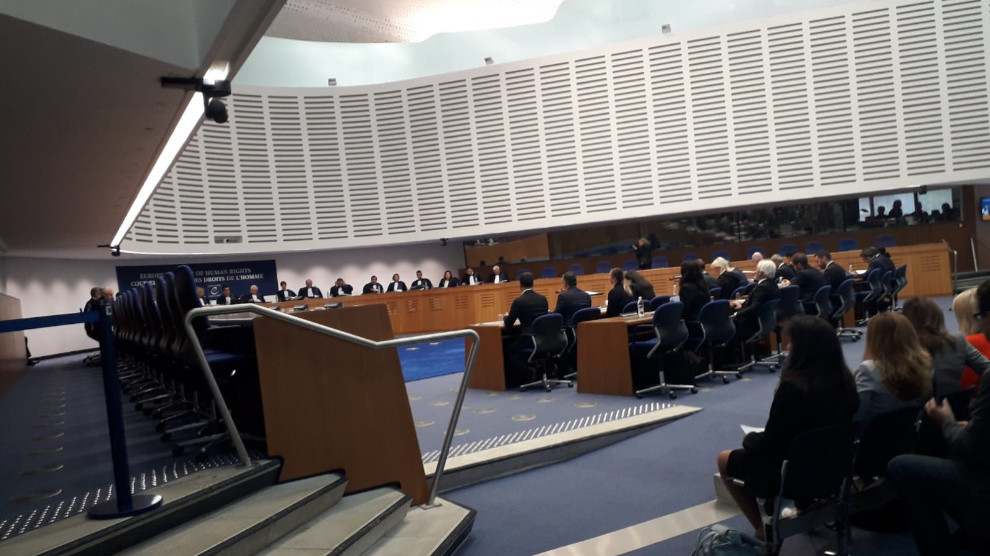Lawyers of Demirtaş submit defense at ECHR Grand Chamber
The hearing concerning HDP’s Selahattin Demirtaş has taken place at the Grand Chamber of European Court of Human Rights (ECHR).
The hearing concerning HDP’s Selahattin Demirtaş has taken place at the Grand Chamber of European Court of Human Rights (ECHR).

Former co-chair of Peoples’ Democratic Party (HDP), Selahattin Demirtaş was arrested on November 4, 2016, together with 12 other HDP deputies. For this unlawful, unjust and politically-motivated arrest and detention an application was submitted to the Constitutional Court and the European Court of Human Rights (ECtHR).
While the Turkish Constitutional Court found no violation of rights in Demirtaş's detention in their ruling dated December 21, 2017, the ECtHR ruled on November 20, 2018 that the article which protects the right to liberty and security, Article 5 §3 of the European Convention on Human Rights was violated as Criminal Courts of Peace, Assize Courts, and the Constitutional Court failed to present any sufficient justifications for the continued detention of the former HDP co-chair Selahattin Demirtaş who has been under detention since November 4, 2016.
Furthermore, the Court decided that right to free elections guaranteed by the Article 3 of the Protocol no. 1 to the Convention was also violated, particularly considering both the status of Selahattin Demirtaş as a Member of the Parliament and the co-chair of an oppositional party, and the status of the voters he represented, as it was impossible for him to take part in the activities of the National Assembly on account of his detention.
Along with such violations of rights, the Court decided that the Article 18 on limitation on use of restrictions on rights of the Convention was also violated, concluding that the applicant was detained due to political reasons, his arrest and detention pursued the predominant ulterior purpose of stifling pluralism and limiting freedom of political debate, and therefore not only Demirtaş’s individual rights and freedoms were threatened, but considering the broader political atmosphere in Turkey, the democratic system as a whole was under threat as well.
Moreover, the Court ruled for the immediate release of the applicant Demirtaş, stating that his further confinement without any new evidence would amount to continued violations of Article 46 of the Convention.
On February 19, 2019, lawyers appealed to the Grand Chamber to review the violations found by the Chamber's decision in accordance with the Court's established case-law. The Government also lodged an objection against the Court's decision of violations.
The ECtHR accepted the applications of both parties and the case was moved to the Grand Chamber to hold a hearing on September 18, 2019 regarding the entirety of the case.
The hearing was followed by an HDP delegation including co-chair Sezai Temelli, Demirtaş’s wife Başak Demirtaş, and a CHP (Republican People’s Party) delegation including MP Sezgin Tanrıkulu.
The defense was submitted by lawyers Prof. Dr. Başak Çalı, Dr. Kerem Altıparmak, Mahsuni Karaman, Benan Molu, Ramazan Demir and Aygül Demirtaş.
The lawyers pointed out the role played by Demirtaş for the accomplishment of talks between Kurdish People’s Leader Abdullah Öcalan and Turkish state officials.
Remarking that Demirtaş was targeted by the government deliberately, lawyers pointed out that Demirtaş was further deprived of political activities.
Lawyers further pointed to the political coup against the HDP staged on 4 November 2016 and the violation of articles of the European Convention on Human Rights.
“For the imprisonment of Demirtaş, Diyarbakır Court put forward nine justifications, all of which were related to the speeches he had made as the co-chair of the second biggest opposition party in Turkey. An opposition leader’s speeches with political concept were put forward as the base for the arrest warrant.”
MIJATOVIC: TURKISH JUDICIARY BECAME A SUPPRESSION MECHANISM
Council of Europe Commissioner for Human Rights Dunja Mijatovic also attended the hearing and spoke.
Mijatovic pointed out that independence of judiciary in Turkey is impaired and that the judiciary has become a suppression mechanism against the opposition.
The hearing was also followed by around 20 members of the European Parliament from the Socialists and Greens groups.